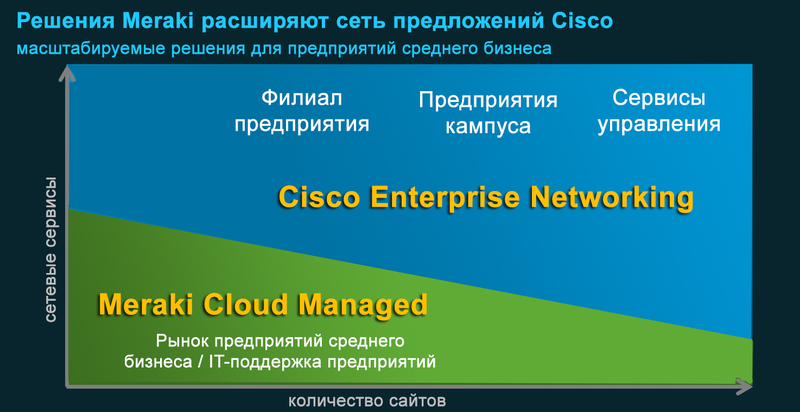5 reasons why Cisco bought Meraki for $ 1.2 billion
 Buying by Cisco Systems for $ 1.2 billion to Meraki was expensive, but at the same time a necessary measure, if the company was going to enter the market of small and medium-sized businesses. In the meantime, this purchase provides Cisco with the tools to counter its increasingly strong competitor, Aruba Networks.
Buying by Cisco Systems for $ 1.2 billion to Meraki was expensive, but at the same time a necessary measure, if the company was going to enter the market of small and medium-sized businesses. In the meantime, this purchase provides Cisco with the tools to counter its increasingly strong competitor, Aruba Networks.Aruba Networks is a privately owned company with about 330 employees, and its main customers are medium-sized businesses, including companies such as Applebee's and Starbucks, as well as several school districts and federal and regional government organizations.
In fact, Meraki’s technologies are capable of providing Wi-Fi, switching, security and mobile device management through a centralized cloud platform. Meraki attracts medium-sized enterprises by the fact that with its help such enterprises do not have to expand the staff of the IT department to build their own networks.
If the solutions offered by Meraki sound familiar, it is because Aruba Networks is already offering something similar.
During a conference call with analysts, Rob Soderbery, vice president of the Cisco group of companies, said that Meraki would form the basis of the company's cloud division. Meraki products will also serve as the main platform for meeting the needs of medium-sized client companies. Soderbury said:
')
“This purchase brings us closer to a business model based on software and cloud technologies. Midsize businesses are developing faster than large corporations, and Cisco has a relatively small share in this market. In addition, Meraki’s profits and growth, as well as its range of products and services, fit perfectly into the Cisco business model. While Meraki started its activities as a company with a fairly narrow specialization, we were convinced that the solutions that it offered were an offer that was impossible to refuse. We tend to position Meraki as the main cloud platform for solving the problems of medium-sized businesses. ”
“This is not just a takeover in order to take possession of a product or human resources, we see Meraki as a new platform for building cloud interfaces for Cisco,” Soderbury stressed.
Cisco executives stated that the cost of buying Meraki was satisfactory, as the deal was strategic. The image shows Cisco's plans for implementing Meraki solutions:

So, does buying really make sense? In general, analysts affirmatively answer this question. Here are five reasons why buying a Meraki makes sense.
Cisco needs to enter the midsize business.
Large enterprises are simply developing more slowly. And companies like Meraki are able to take a low start and grow rapidly. “While the main product line of Meraki continues to be WLAN devices, the company has entered the market of switches and protection devices,” said analyst Stifel Nicolaus, Sanjiv Wadhwani. It was only a matter of time before Meraki attacked Cisco.
Vadwani added:
"Cisco lacked controller-free products and, therefore, the company was not able to simply organize address space for the SME segment, which is one of the fastest growing markets in the WLAN segment."

Meraki gives Cisco a cloud strategy.
The idea behind Meraki solutions is that customers do not need professional IT specialists to solve problems. Such problems are solved with the help of cloud interfaces, and this fact is especially useful for companies with many branches, offices, an extensive sales network and large campuses. William Blair analyst Jason Ader said:
“We believe that Meraki’s cloud-based software is a jewel in this deal from a Cisco perspective and can be used to create many cloud products already in the Cisco group of companies in the future.”
Cisco needs to protect gross margins.
Wedbush analyst Rohit Chopra stated:
“Compared to Cisco, Meraki showed the third system at a comparable cost. In our opinion, Cisco simply could not afford to lower the price so much in the rapidly growing market segment without sacrificing gross profit. It seems that Cisco is trying to reduce its costs and make the company more competitive in the SMB segment, simultaneously creating a platform from which a cloud service can be created. ”
Platform Meraki wider.
Solutions of this company are easy to use: from wireless technologies to mobile device management.
Cisco is able to beat Aruba Networks in a battle for the market.
Meraki’s Cisco acquisition aims to conquer the local wireless network market. Aruba is struggling with Cisco for the enterprise market, although it is focused on the market for small and medium-sized companies with its Aruba Instant product line. With Meraki in its investment portfolio, Cisco can fight Aruba on two fronts at once.
Can you complement this top five?
Source: https://habr.com/ru/post/159817/
All Articles